For a brief period during the Weimar Republic, Hertha Thiele (1908-1984) appeared in several controversial stage plays and films. She is best known for playing a 14 year old schoolgirl in love with her female teacher in the ground-breaking Mädchen in Uniform/Girls in Uniform (1931). She received thousands of fan letters - mostly from women. Decades later, Thiele became a well known film and television actress in East Germany.
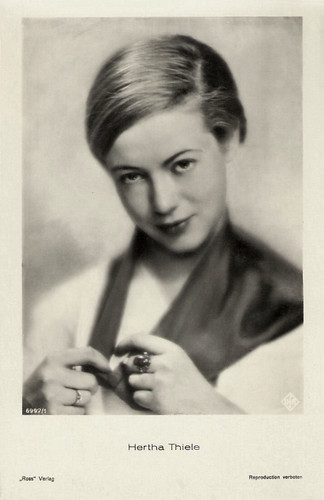
German postcard by Ross Verlag, no. 6997/1, 1931-1932. Photo: Ufa.
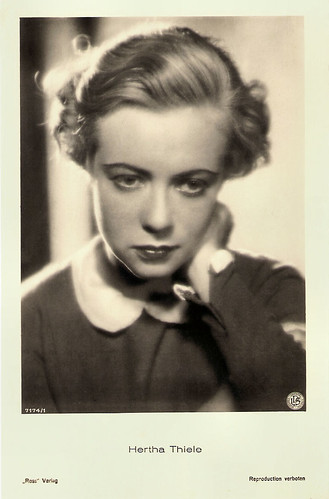
German postcard by Ross Verlag, no. 7174/1, 1932-1933. Photo: Deutsche Lichtspiel-Syndikat (DLS). Publicity still for Das erste Recht des Kindes/The first right of the child (Fritz Wendhausen, 1932).
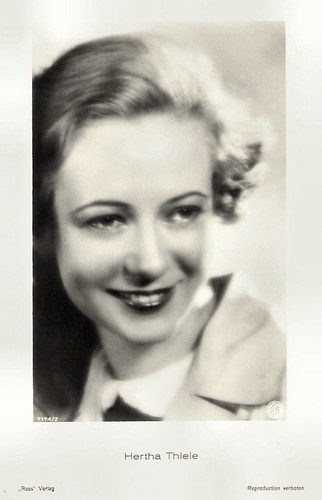
German postcard by Ross Verlag, no. 7174/2, 1932-1933. Photo: Deutsche Lichtspiel-Syndikat (DLS). Publicity still for Das erste Recht des Kindes/The first right of the child (Fritz Wendhausen, 1932).
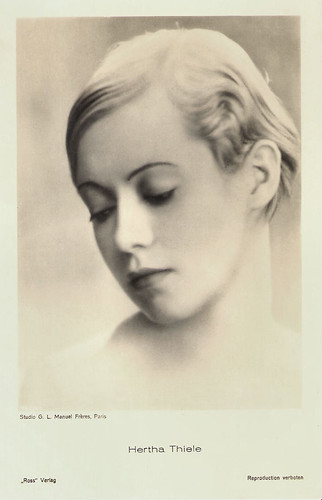
German postcard by Ross Verlag, no. 7423/1, 1932-1933. Photo: G.L. Manuel Frères, Paris.
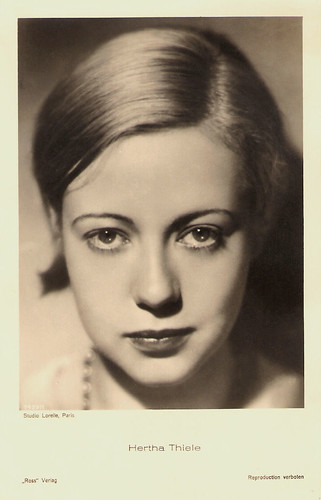
German postcard by Ross Verlag, no. 7423/1, 1932-1933. Studio Lorelle, Paris.
Hertha Thiele was born in Leipzig in 1908. Her father worked as a locksmith. She began her acting career on stage at the Schauspielhaus (theatre house) in Leizig with the play Krankheit der Jugend/Disease of Youth by Ferdinand Bruckner in 1928.
Two years later she had her breakthrough there in the original version of Christa Winsloe's play Ritter Nerestan/Knight Nerestan, set in a Prussian boarding school for girls.
She made her film debut in the adaptation, Mädchen in Uniform/Girls in Uniform (Leontine Sagan, Carl Froelich, 1931). Thiele played Manuela, a schoolgirl deeply infatuated with her teacher, played by Dorothea Wieck. The film made her a star and she received thousands of fan letters, mostly from women.
Next Hertha Thiele starred with Ernst Busch in Bertolt Brecht's Kuhle Wampe/To Whom Does the World Belong? (Slatan Dudow, 1932). This interesting film shows the difficult life of a working class family in Berlin in times of the Great Depression. The film was censored in 1932 and banned by the Nazis in 1933, accused of communist tendencies.
Thiele also had a leading role opposite Hermann Thimig and Viktor de Kowa in Kleiner Mann, was nun?/Little Man What Now (Fritz Wendhausen, 1933) based on the novel by Hans Fallada.
She was reunited with Dorothea Wieck in another lesbian-themed film, Anna und Elisabeth/Anna and Elizabeth (Frank Wisbar, 1933). The film was banned by the Nazis soon after it opened. Later, Thiele said that this was the most important work of her career. During the early 1930s, she also continued to play in stage productions by Max Reinhardt (Molnar's Harmonie, 1932) and Veit Harlan (Veronika, 1935).
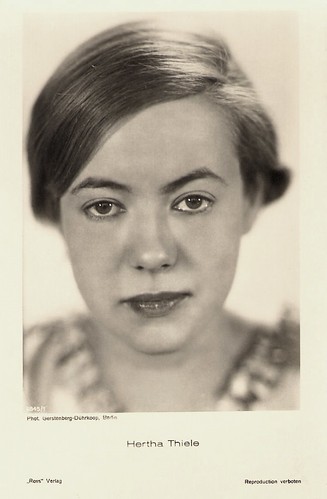
German postcard by Ross Verlag, no. 6845/1, 1931-1932. Photo: Gerstenberg-Dührkoop, Berlin.
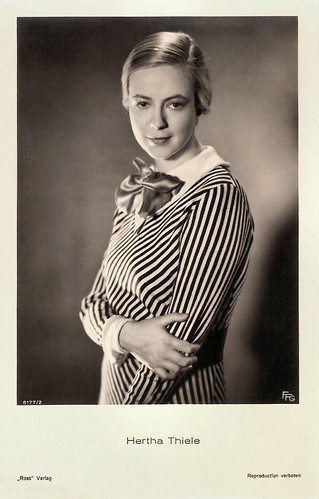
German postcard by Ross Verlag, no. 8117/2, 1933-1934. Photo: FFG (Carl Froelich-Film GmbH). Publicity still for Reifende Jugend/Ripening Youth (Carl Froelich, 1933).
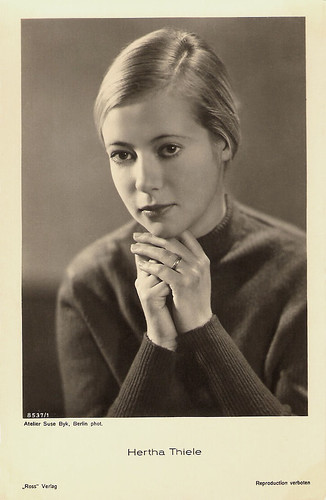
German postcard by Ross Verlag, no. 8537/1, 1933-1934. Photo: Suse Byk, Berlin.
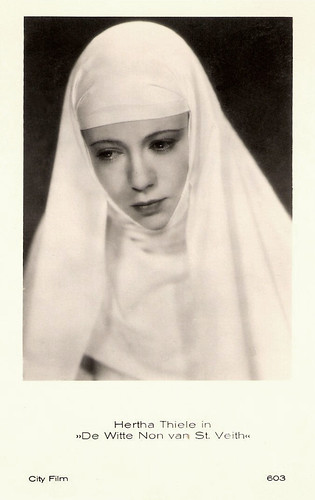
Dutch postcard by City Film, no. 603. Photo: publicity still for Elisabeth und der Narr/Elisabeth, die weisse Schwester von St. Veith (Thea von Harbau, 1934). Hertha Thiele starred as Elisabeth Dietrich.
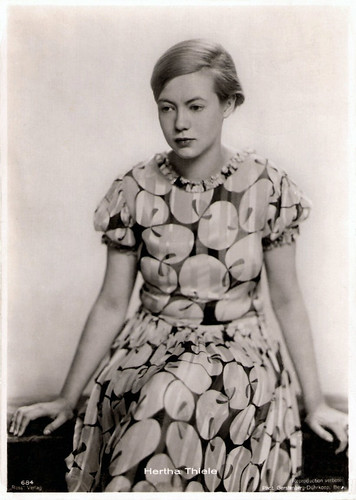
German postcard by Ross Verlag, no. 684. Photo: Gerstenberg-Dührkoop, Berlin.
In 1933 the Nazi government approached Hertha Thiele to appear in the propaganda film Hans Westmar (Franz Wenzler, 1933). She replied to propaganda minister Josef Goebbels: "I don't blow with the wind each time it changes directions." Her film career was thwarted.
In 1932 she had married actor Heinz Klingenberg. She left him when he accepted the title role in the propaganda-film S.A.-Mann Brand/Storm Trooper Brand (Frans Seitz, 1933). They divorced in 1936. That year she was also excluded from the Reichstheater and Reichsfilmkammer.
After this Berufsverbot she left Germany for Switzerland in 1937. It took five years before she was able to find acting work in Bern.
In 1949 Thiele went with her second, Swiss husband to East Germany where she worked for the Berliner Rundfunk. She tried to start a theatre there, but did not succeed. For years she lived in Switzerland and Paris, working as a psychiatric nursing assistant.
In 1966, she finally returned to East Germany. There she worked in stage productions in Magdeburg and Leipzig. During the 1970s she was often seen in TV series and made-for-TV films, including the popular crime series Polizeiruf 110/Police Call 110.
Thiele's work was featured in a television documentary Das Herz auf der linken Seite/The Heart at the Left Side (1975). In 1983 followed a retrospective at the Berlin Film Festival (Exil – Sechs Schauspieler aus Deutschland/Exile - Six Actors from Germany) and a monography on her life and work, which was published by the Deutsche Kinematek.
To her last films belong the DEFA productions Die Legende von Paul und Paula/The Legend of Paul and Paula (Heiner Carow, 1973) starring Angelica Domröse, and Die Unverbesserliche Barbara/The Incorrigible Barbara (Lothar Warneke, 1977) with Dutch actress Cox Habbema.
Hertha Thiele died in 1984 in East-Berlin.
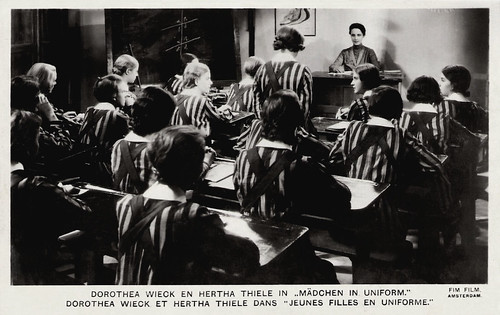
Dutch Postcard by M. Bonnist & Zonen, Amsterdam, Z., no. 104 e. Photo: Fim Film, Amsterdam. Publicity still for Mädchen in Uniform/Girls in Uniform (Leontine Sagan, Carl Froelich, 1931).
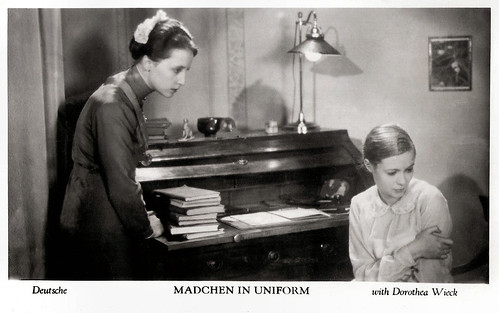
British card in the series Film Shots by Film Weekly. Photo: Deutsche. Publicity still for Mädchen in Uniform/Girls in Uniform (Leontine Sagan, Carl Froelich, 1931) with Dorothea Wieck.
Scene from Mädchen in Uniform/Girls in Uniform (1931). Source: Greek Anon (YouTube).
Scene from Kuhle Wampe/To Whom Does the World Belong? (1932). Source: Kanal von raikomat (YouTube).
Trailer for Die Legende von Paul und Paula (1973). Source: DEFA Stiftung (YouTube).
Sources: Stephanie D'heil (Steffi-line - German), Thomas Staedeli (Cyranos), Filmportal.de (German), Wikipedia, and IMDb.

German postcard by Ross Verlag, no. 6997/1, 1931-1932. Photo: Ufa.

German postcard by Ross Verlag, no. 7174/1, 1932-1933. Photo: Deutsche Lichtspiel-Syndikat (DLS). Publicity still for Das erste Recht des Kindes/The first right of the child (Fritz Wendhausen, 1932).

German postcard by Ross Verlag, no. 7174/2, 1932-1933. Photo: Deutsche Lichtspiel-Syndikat (DLS). Publicity still for Das erste Recht des Kindes/The first right of the child (Fritz Wendhausen, 1932).

German postcard by Ross Verlag, no. 7423/1, 1932-1933. Photo: G.L. Manuel Frères, Paris.

German postcard by Ross Verlag, no. 7423/1, 1932-1933. Studio Lorelle, Paris.
Lesbian-themed Films
Hertha Thiele was born in Leipzig in 1908. Her father worked as a locksmith. She began her acting career on stage at the Schauspielhaus (theatre house) in Leizig with the play Krankheit der Jugend/Disease of Youth by Ferdinand Bruckner in 1928.
Two years later she had her breakthrough there in the original version of Christa Winsloe's play Ritter Nerestan/Knight Nerestan, set in a Prussian boarding school for girls.
She made her film debut in the adaptation, Mädchen in Uniform/Girls in Uniform (Leontine Sagan, Carl Froelich, 1931). Thiele played Manuela, a schoolgirl deeply infatuated with her teacher, played by Dorothea Wieck. The film made her a star and she received thousands of fan letters, mostly from women.
Next Hertha Thiele starred with Ernst Busch in Bertolt Brecht's Kuhle Wampe/To Whom Does the World Belong? (Slatan Dudow, 1932). This interesting film shows the difficult life of a working class family in Berlin in times of the Great Depression. The film was censored in 1932 and banned by the Nazis in 1933, accused of communist tendencies.
Thiele also had a leading role opposite Hermann Thimig and Viktor de Kowa in Kleiner Mann, was nun?/Little Man What Now (Fritz Wendhausen, 1933) based on the novel by Hans Fallada.
She was reunited with Dorothea Wieck in another lesbian-themed film, Anna und Elisabeth/Anna and Elizabeth (Frank Wisbar, 1933). The film was banned by the Nazis soon after it opened. Later, Thiele said that this was the most important work of her career. During the early 1930s, she also continued to play in stage productions by Max Reinhardt (Molnar's Harmonie, 1932) and Veit Harlan (Veronika, 1935).

German postcard by Ross Verlag, no. 6845/1, 1931-1932. Photo: Gerstenberg-Dührkoop, Berlin.

German postcard by Ross Verlag, no. 8117/2, 1933-1934. Photo: FFG (Carl Froelich-Film GmbH). Publicity still for Reifende Jugend/Ripening Youth (Carl Froelich, 1933).

German postcard by Ross Verlag, no. 8537/1, 1933-1934. Photo: Suse Byk, Berlin.

Dutch postcard by City Film, no. 603. Photo: publicity still for Elisabeth und der Narr/Elisabeth, die weisse Schwester von St. Veith (Thea von Harbau, 1934). Hertha Thiele starred as Elisabeth Dietrich.

German postcard by Ross Verlag, no. 684. Photo: Gerstenberg-Dührkoop, Berlin.
Not Blowing With The Wind
In 1933 the Nazi government approached Hertha Thiele to appear in the propaganda film Hans Westmar (Franz Wenzler, 1933). She replied to propaganda minister Josef Goebbels: "I don't blow with the wind each time it changes directions." Her film career was thwarted.
In 1932 she had married actor Heinz Klingenberg. She left him when he accepted the title role in the propaganda-film S.A.-Mann Brand/Storm Trooper Brand (Frans Seitz, 1933). They divorced in 1936. That year she was also excluded from the Reichstheater and Reichsfilmkammer.
After this Berufsverbot she left Germany for Switzerland in 1937. It took five years before she was able to find acting work in Bern.
In 1949 Thiele went with her second, Swiss husband to East Germany where she worked for the Berliner Rundfunk. She tried to start a theatre there, but did not succeed. For years she lived in Switzerland and Paris, working as a psychiatric nursing assistant.
In 1966, she finally returned to East Germany. There she worked in stage productions in Magdeburg and Leipzig. During the 1970s she was often seen in TV series and made-for-TV films, including the popular crime series Polizeiruf 110/Police Call 110.
Thiele's work was featured in a television documentary Das Herz auf der linken Seite/The Heart at the Left Side (1975). In 1983 followed a retrospective at the Berlin Film Festival (Exil – Sechs Schauspieler aus Deutschland/Exile - Six Actors from Germany) and a monography on her life and work, which was published by the Deutsche Kinematek.
To her last films belong the DEFA productions Die Legende von Paul und Paula/The Legend of Paul and Paula (Heiner Carow, 1973) starring Angelica Domröse, and Die Unverbesserliche Barbara/The Incorrigible Barbara (Lothar Warneke, 1977) with Dutch actress Cox Habbema.
Hertha Thiele died in 1984 in East-Berlin.

Dutch Postcard by M. Bonnist & Zonen, Amsterdam, Z., no. 104 e. Photo: Fim Film, Amsterdam. Publicity still for Mädchen in Uniform/Girls in Uniform (Leontine Sagan, Carl Froelich, 1931).

British card in the series Film Shots by Film Weekly. Photo: Deutsche. Publicity still for Mädchen in Uniform/Girls in Uniform (Leontine Sagan, Carl Froelich, 1931) with Dorothea Wieck.
Scene from Mädchen in Uniform/Girls in Uniform (1931). Source: Greek Anon (YouTube).
Scene from Kuhle Wampe/To Whom Does the World Belong? (1932). Source: Kanal von raikomat (YouTube).
Trailer for Die Legende von Paul und Paula (1973). Source: DEFA Stiftung (YouTube).
Sources: Stephanie D'heil (Steffi-line - German), Thomas Staedeli (Cyranos), Filmportal.de (German), Wikipedia, and IMDb.
No comments:
Post a Comment